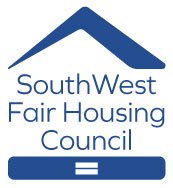Fair Housing FAQs
-
Yes. Since 1988, when "familial status" was added as a protected class under the Fair Housing Act, courts have found that swimming pool rules limiting access based on age (such as requiring adult supervision or having adult-only swim times) may constitute discrimination. Instead of focusing on age, housing providers should craft policies that address behavior (e.g., requiring swimmers to be accompanied by a competent adult), while ensuring rules meet legitimate safety or business needs without discriminating against families with children.
-
SWFHC can only help with housing discrimination claims related to treatment based on a protected class, such as race, color, national origin, religion, sex, familial status, or disability.SWFHC cannot provide legal advice or help with landlord-tenant issues, such as deposit returns, maintenance requests, code violations, pending evictions, lease breaks, etc. For additional information and support, please visit the Helpful Links Section on our resources page.
-
No. SWFHC provides all enforcement services, such as intakes, investigation, and advocacy, through the fair housing complaint process at no charge. -
SWFHC provides fair housing education, outreach, and enforcement services throughout Arizona. -
No. SWFHC does not provide legal representation. -
Record the experiences. For example, write down the names of individuals, companies, addresses, phone numbers, dates, times, and witnesses involved.Keep copies of advertising, letters, or other relevant information.
Contact the Southwest Fair Housing Council at 1-888-624-4611 email intake@swfhc.org, or fill out our Contact Form Here.
-
Landlords cannot legally evict tenants based on discriminatory reasons protected under the Fair Housing Act, such as race, color, national origin, religion, sex, disability, or familial status, even if other reasons for eviction might seem legitimate.
-
No. The Fair Housing Act protects families with children, including those pregnant or in the process of adoption or fostering, from eviction based on familial status. Landlords also cannot impose and enforce overly restrictive rules targeting children and then evict families for such reasons.
-
Indicators can include evicting a tenant for not speaking English, for being perceived as LGBTQI+, or because of tenant complaints driven by discriminatory preferences. Any eviction based on these grounds constitutes national origin, sex, or other forms of discrimination.
-
An assistance animal is not a pet but an animal that performs tasks, offers support, or provides services for someone with a disability. They can include animals that offer emotional support to ease the symptoms of a disability.
-
No, assistance animals do not require official certification or training. They serve in various ways to support individuals with disabilities.
-
If your landlord refuses your request, and you believe it's unjustified, you can ask us to investigate for possible discrimination. Landlords must grant reasonable accommodation requests if they're legitimate and don't impose undue hardship.
-
You should give your landlord a letter from a medical professional stating your disability and the need for your assistance animal. You may also add a personal statement requesting the landlord to make a “reasonable accommodation” to allow your assistance animal.
-
Yes, evicting a tenant because they live with an assistance animal, including for failing to pay pet fees for the assistance animal, is illegal under the Fair Housing Act.
-
Under the Violence Against Women Act (VAWA), it is illegal to evict or penalize tenants for seeking emergency assistance, including law enforcement, regardless of local nuisance or crime-free housing laws.
-
Landlords cannot evict or threaten to evict tenants for reporting discrimination, assisting others in exercising their fair housing rights, participating in HUD investigations, or requesting reasonable accommodations due to disability.
-
Landlords must consider disability-related reasonable accommodation requests that could stop an eviction, such as adjusting payment schedules for disability-related government assistance or accommodating tenants with mental health conditions to resolve lease violations influenced by their disability.
-
Yes. If an eviction policy disproportionately harms a group of people with a protected characteristic and is not necessary to achieve a legitimate interest, or if a less discriminatory alternative is available, it can be considered discriminatory under the Fair Housing Act.
-
Yes! SWFHC holds regular monthly classes; look at our schedule and register for events here. You can also reach out to schedule a personalized training, request a presentation, or provide information for community events. Email trainings@swfhc.org to schedule. -
SWFHC is continually hiring testers to assist in investigating potential housing discrimination statements. Apply Here.
